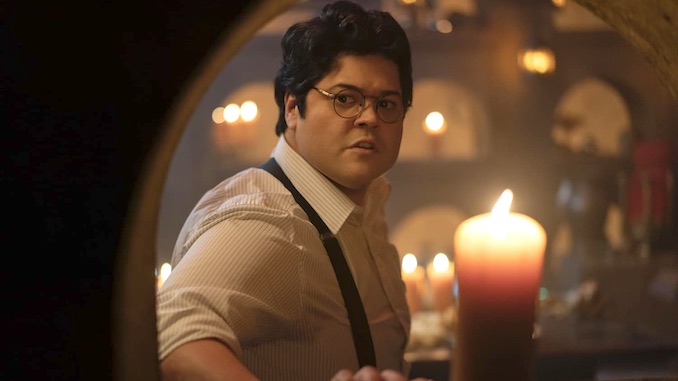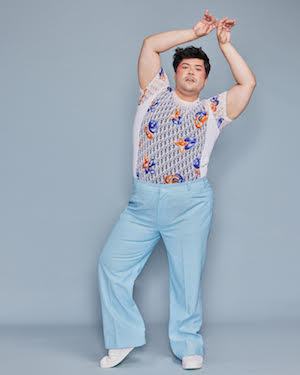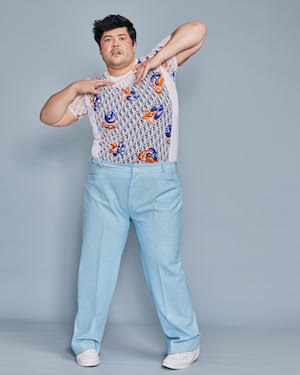Harvey Guillén on the Moment What We Do in the Shadows Fans Have Been Waiting For
Photos Courtesy of FX, Giancarlo Pawelec

[Spoilers below for Season 4, Episode 7 (“Pine Barrens”) of What We Do in the Shadows]
The fourth season of What We Do in the Shadows has been a transformative journey. For the only human in a house of vampires, the Van Helsing-descendant Guillermo, the latest horror comedy episode, “Pine Barrens”, is a turning point in the form of a long-awaited coming out.
The human familiar has long desired to be turned into a vampire by his master Nandor (Kayvan Novak) and roommates Laszlo (Matt Berry) and Nadja (Natasia Demetriou). Meanwhile, through the past four seasons, he’s also been coming to terms with his sexuality in a slow-burn story of self-acceptance. “Pine Barrens” sees Guillermo invite his human family to the home of his vampiric found family in a coming out that is far from conventional. Paste spoke to Harvey Guillén, the actor who brings Guillermo’s story to life with colourful detail, about his character’s unique coming out scene, his own path to queer self-acceptance, and the uplifting portrayal of a Mexican-descent family.
![]()
Paste: How long has Guillermo’s coming out scene been in the works?
Harvey Guillén: We asked the question early on, and obviously, with the relationship between Guillermo and Nandor of “wait, is he? Isn’t he?” Even when people are asking him, he says things like he doesn’t kiss and tell. [Guillermo] moving to London for a year with Nadja opened up his world, and he comes back more confident and more sure of himself. Part of his road to understanding who he is was to have that freedom to be in a different country with different people and a different atmosphere. Not everyone gets that luxury. I feel like sometimes it’s hard when you’re growing up in a small town, religious family or different upbringing, it’s hard to completely be your authentic self sometimes because you’ve established this persona and the idea of what everyone likes you to be and what they see you as. You don’t want to disappoint them or be scared to be your authentic self. I’m glad that Guillermo is finally himself, proud and happy.
 Paste: What was your first impression upon reading Guillermo’s coming-out scene in the script?
Paste: What was your first impression upon reading Guillermo’s coming-out scene in the script?
Guillén: It was like seeing a mirror to the idea of recalling my personal coming out, being queer, and how sometimes when the time is right, it’s just right. The way that it was written was so beautiful, it’s like being in the middle of two worlds. In the world where you’re accepted, the vampires have made it clear that they don’t care if you are queer, nothing’s better in life than loving, feasting, and fucking, and all of those things that the vampires love to do. On the other side, we have his family, who is literally a group of vampire hunters, and who are very religious with the household’s Mexican culture. His fear is that his actual biological family would not accept him—that was really heartbreaking for me to read in the script.
The whole scene played out in different ways, but one of the first times we did it, it was very emotional. I don’t even think we could have even used the footage because I was just a crying mess. Then the actress who plays my mom started to cry and then the whole family started to cry. They hugged me and it was a really great embrace. The edited version we have is because, at the end of the day, they’re making a comedy so they wanted to make it light but also make a great point. I think it was perfectly done.
Paste: It was interesting that Guillermo’s family had a stronger reaction to him saying he wants to be a vampire than when he says he’s gay. I presume that the uplifting portrayal of a Mexican-descendent family was an important factor to come across in the scene for you?
-

-

-

-

-

-

-

-

-

-

-

-

-

-

-

-

-

-

-

-

-

-

-

-

-

-

-

-

-

-

-

-

-

-

-

-

-

-

-

-

 Paste: There’s a moment in Season 3, the casino episode, where a lot of fans theorized Guillermo was trying to come out but got cut off. Do you think that was an attempt at a coming out moment?
Paste: There’s a moment in Season 3, the casino episode, where a lot of fans theorized Guillermo was trying to come out but got cut off. Do you think that was an attempt at a coming out moment?






































